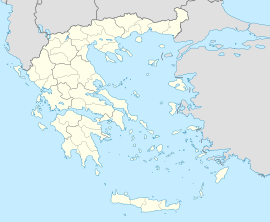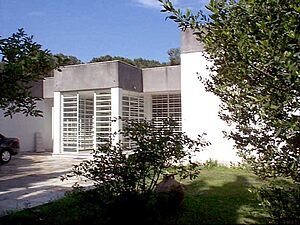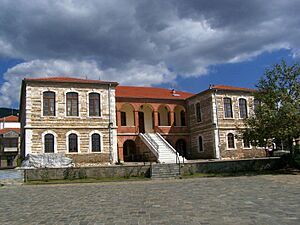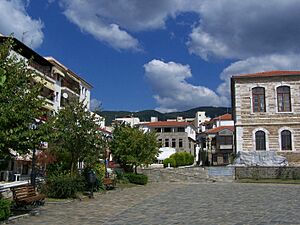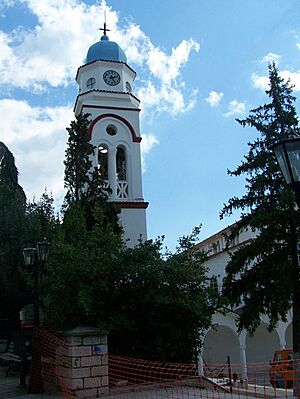Polygyros facts for kids
Quick facts for kids
Polygyros
Πολύγυρος
|
|
|---|---|
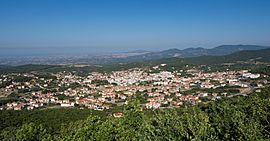
Polygyros from east
|
|
| Country | Greece |
| Administrative region | Central Macedonia |
| Regional unit | Chalkidiki |
| Area | |
| • Municipality | 947.4 km2 (365.8 sq mi) |
| • Municipal unit | 470.9 km2 (181.8 sq mi) |
| Elevation | 560 m (1,840 ft) |
| Population
(2021)
|
|
| • Municipality | 21,351 |
| • Municipality density | 22.5364/km2 (58.369/sq mi) |
| • Municipal unit | 11,382 |
| • Municipal unit density | 24.171/km2 (62.602/sq mi) |
| Community | |
| • Population | 7,779 (2021) |
| Time zone | UTC+2 (EET) |
| • Summer (DST) | UTC+3 (EEST) |
| Postal code |
631 00
|
| Area code(s) | 23710 |
| Vehicle registration | ΧΚ |
Polygyros (in Greek: Πολύγυρος) is a town and a local government area called a municipality in Central Macedonia, Greece. It is the main city of Chalkidiki.
Contents
Geography of Polygyros
Polygyros town is home to 7,779 people (as of 2021). It is built like an amphitheater on a high flat area. This area is on the southwest side of the Cholomontas mountain. The town is located south of Greek National Road 16, which connects Thessaloniki and Arnaia. Polygyros is southeast of Thessaloniki, northeast of Nea Moudania, northwest of Sithonia, and southwest of Arnaia.
The larger municipal unit (which was the municipality before 2011) has 11,386 people (2021). It covers an area of about 470.9 square kilometers. Other important communities in this area include Ólynthos (1,053 people), Taxiárchis (742 people), and Vrástama (944 people).
Polygyros Climate
Polygyros has a climate that is mostly warm and dry in summer. It is called a hot-summer Mediterranean climate (Köppen: Csa). It is also very close to a humid subtropical climate (Köppen: Cfa). This means it has fairly cold winters and warm summers. This is because of its higher location.
| Climate data for Polygyros town (580m) | |||||||||||||
|---|---|---|---|---|---|---|---|---|---|---|---|---|---|
| Month | Jan | Feb | Mar | Apr | May | Jun | Jul | Aug | Sep | Oct | Nov | Dec | Year |
| Mean daily maximum °C (°F) | 7.3 (45.1) |
10 (50) |
13 (55) |
15 (59) |
21.2 (70.2) |
25.8 (78.4) |
27.7 (81.9) |
29.1 (84.4) |
25 (77) |
20.9 (69.6) |
14.4 (57.9) |
10.1 (50.2) |
18.3 (64.9) |
| Mean daily minimum °C (°F) | 1.8 (35.2) |
3.5 (38.3) |
6.5 (43.7) |
8.2 (46.8) |
13.1 (55.6) |
17.9 (64.2) |
20.2 (68.4) |
21.1 (70.0) |
17.8 (64.0) |
13.9 (57.0) |
9.6 (49.3) |
6 (43) |
11.6 (53.0) |
| Average precipitation mm (inches) | 49.7 (1.96) |
21.1 (0.83) |
52.9 (2.08) |
72.4 (2.85) |
33.7 (1.33) |
77.3 (3.04) |
44.2 (1.74) |
13.8 (0.54) |
33 (1.3) |
35.7 (1.41) |
74.5 (2.93) |
96.5 (3.80) |
604.8 (23.81) |
| Source: http://penteli.meteo.gr/stations/polygyros/ (2019 - 2020 averages) | |||||||||||||
Origin of the Name Polygyros
There are different ideas about where the name Polygyros comes from.
- Some people think it combines poly (meaning "much") and geros (meaning "strong"). This could be because of the healthy climate in the area.
- Others believe it comes from poly and ieros (meaning "sacred"). This might be due to an old temple that was once in the area.
- Another idea is that the name comes from an old landowner named Polyaros.
- Finally, some think it comes from poly and gyros (meaning "round"). This could describe the town's shape, which is like an amphitheater.
Polygyros Municipality
The Polygyros municipality was created in 2011. This happened when four smaller municipalities joined together. These four areas became what are now called municipal units:
- Anthemountas
- Ormylia
- Polygyros (the original one)
- Zervochoria
The whole municipality covers about 947.4 square kilometers. The municipal unit of Polygyros itself is about 470.9 square kilometers. The municipality includes villages like Vrastama, Taxiarchis, Ormylia, Olynthos, Gerakini, and Kalives.
History of Polygyros
Ancient Times in Polygyros
Some historians believe that the ancient city of Apollonia was located near where Polygyros is today. Apollonia was one of 32 cities that formed the Koinon ton Chalkideon (Chalkidian League). This league was led by the city of Olynthus. In 379 BCE, the Spartans destroyed the league. Later, in 348 BCE, Philipp II of Macedon added all of Chalcidice to the Macedonian Kingdom. By 168 BCE, the Romans took control of Chalcidice.
Byzantine and Ottoman Eras
The town of Polygyros is first mentioned in an old official document from the Eastern Roman Emperor Nikephoros III Botaneiates around 1080 CE. In 1430, like the rest of the Eastern Roman Empire, Polygyros was taken over by the Ottomans. It became part of the Sanjak of Thessaloniki.
On May 17, 1821, the people of Polygyros rose up against the Ottoman rulers. They managed to push out the Ottoman guards for a short time. However, Polygyros and other villages in the area were later burned by the Ottomans. Many people from Polygyros also joined a failed uprising against the Ottomans in 1854.
Modern Polygyros
Finally, on November 2, 1912, the Greek army entered Polygyros. This happened during the First Balkan War, and the town became part of the Greek State.
Culture in Polygyros
Polygyros is well-known for its fun carnival celebrations. These events bring visitors from all over Greece. There is also a special religious celebration on August 15 at a nearby place called Panagia (Virgin Mary).
Local groups work to keep folk music and dance traditions alive. You can also learn about classic and modern music at the town's music school. The town also has a Folklore Museum, which opened in 1998.
Sports in Polygyros
The local football (soccer) team in Polygyros is called Niki (which means "victory"). They play in the Greek National Fourth Division Professional League. The local basketball team is called AOP (Athletic Club of Polygyros). They play in the Third National Basketball Division.
Landmarks in Polygyros
The Archaeological Museum of Polygyros is an important place to visit. It has many interesting items found from all over Chalkidiki. These items show what life was like during different periods, including the paleolithic (Stone Age), neolithic (New Stone Age), geometric, archaic, classic, hellenistic, and Roman times.
Historical Population of Polygyros
| Year | Community | Municipal unit | Municipality |
|---|---|---|---|
| 1981 | 5,239 | - | - |
| 1991 | 4,501 | 10,218 | - |
| 2001 | 6,227 | 10,444 | - |
| 2011 | 7,459 | 11,386 | 22,048 |
| 2021 | 7,779 | 11,382 | 21,351 |
Notable People from Polygyros
- Margaritis Schinas, a politician.
- Christos Zabounis, an editor.
- Fonis Zoglopitis (1930–2015), a painter.
See also
 In Spanish: Polígiros para niños
In Spanish: Polígiros para niños
 | Laphonza Butler |
 | Daisy Bates |
 | Elizabeth Piper Ensley |


